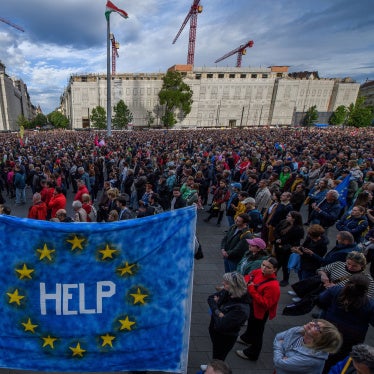Nineteen years, 33 rounds, a damning book, and millions of euros later, the European Union took a modest step yesterday towards making its official human rights dialogue with China a notch more consequential. At a time when the Chinese government is resisting external scrutiny of its human rights record more ferociously than at any time in recent memory, the EU won a battle to wrap up the latest session of the dialogue with a joint press conference.
Li Junhua, the Chinese diplomat heading the delegation, turned in a predictable performance. His remarks made countless references to the “deep,” “broad,” and “frank” nature of the discussions, but provided no specifics. According to Li, everyone around the world agrees China has made tremendous progress in human rights since the beginning of the reform era; criticism given in an “illegal manner” will trigger interest from legal authorities; the developments in Hong Kong are “not human rights issues”; that a country’s compliance with international human rights standards should be assessed with respect to its level of economic development.
Gerhard Sabathil, the lead EU representative, provided some of the detail that makes it possible to hold participants accountable for these interactions, and to simply offer encouragement to those who work on these issues with little success. Sabathil rattled off the issues discussed: the rights of ethnic minorities, particularly in Tibet and Xinjiang; the freedom of religion; the freedom of expression; reform of the “household registration” system; and legal reform, among others.
When asked by a journalist, Sabathil identified three individual cases raised: imprisoned Nobel laureate Liu Xiaobo, the Uighur economist recently sentenced to life in prison, Ilham Tohti, and the veteran journalist on trial for allegedly revealing state secrets, Gao Yu. By publicly identifying these people, Sabathil may well have helped bring them a degree of protection.
There is far more that could have been asked of Li Junhua—why is it acceptable to Beijing to participate in dialogues where Chinese diplomats ask about abuses of Roma, but British parliamentarians cannot go to Hong Kong to enquire as to the health of a treaty to which the UK is a party? How can China, now the world’s second largest economy, continue to argue that civil and political rights must wait?
But for now a brief round of applause to the EU for making it possible for questions to be asked at all. And let’s hope the EU now takes a page from China’s diplomatic playbook and insists that, having done this joint press conference, such events become a fixture at all subsequent dialogues.







